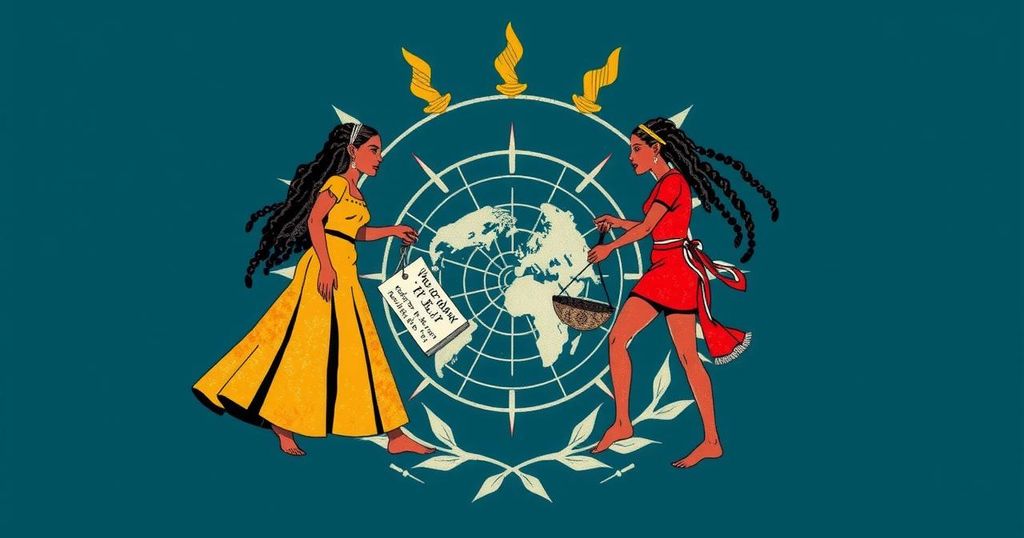This autumn, the UN’s Sixth Committee convened to discuss the Draft Articles on Crimes Against Humanity, reflecting a strong consensus among States to advance towards a binding treaty. Highlighted proposals include recognizing gender-based crimes such as reproductive violence, forced marriage, and gender apartheid, as well as recognizing the slave trade as a distinct crime. With 114 member states expressing support for gender justice, the upcoming decision on whether to commence formal treaty negotiations represents a significant opportunity for global human rights advancement.
In the autumn of 2024, the United Nations General Assembly’s Sixth Committee held pivotal discussions on the Draft Articles concerning Crimes Against Humanity, a legal framework enhancing international accountability. Attended by member States from around the globe, discussions took a promising turn; a significant majority voiced support for transitioning the Draft Articles into a binding treaty—a beacon of hope for justice amid ongoing global atrocities.
Particularly noteworthy was the emphatic call for incorporating gender justice into the treaty, echoing through the chambers as representatives recognized the unique experiences of women under the scourge of crimes against humanity.
Sierra Leone, Nigeria, and others pushed for the explicit recognition of the slave trade as a separate crime, delving into its historical depth and consequences felt across generations. The African Group’s statement reinforced the urgency, stating that denying this inclusion would overlook significant injustices that continue to permeate society, adding weight to their argument for a comprehensive acknowledgment of the crime.
Afghanistan’s representative passionately upheld the necessity to classify gender apartheid as a crime against humanity, shedding light on systemic oppression under current Taliban rule—a vivid reminder of the daily struggles faced by countless women. Moreover, nations like Colombia, Spain, and Denmark called for a robust gender lens in treaty discussions, illustrating the intersection of gender and international law as one of the most urgent conversations in human rights today.
While strides were made, dissenting voices emerged regarding the exclusion of the term ‘gender’ from the treaty draft, with states expressing disappointment over the limitations it may impose. Yet, behind these discussions lies a tapestry of hope, woven through a collective commitment to enshrine gender justice within international law and ensure it becomes a living reality as negotiations loom ahead.
As the Sixth Committee prepares to make decisive choices by late November 2024, the groundwork laid thus far signals a significant moment in history—a step towards recognizing the pain suffered by marginalized groups and seeking justice on a global scale. It is this relentless drive, this steadfast demand for inclusivity and comprehensive accountability, that will shape the future of international law and the fight against crimes against humanity.
In December 2022, the UN General Assembly initiated a series of discussions regarding the Draft Articles on Prevention and Punishment of Crimes Against Humanity. This framework aims to fill the gaps within international law pertaining to such crimes, with an emphasis on advancing gender justice. The Sixth Committee’s gatherings, particularly in October 2024, became crucial in examining how to incorporate gender-related considerations into the legal text. States actively participated, revealing a growing consensus on the necessity to enshrine gender justice as central to addressing crimes against humanity. A notable trend emerged as countries articulated the impact of historical and present injustices—such as the slave trade and gender apartheid—reflecting persistent challenges faced by women and marginalized communities worldwide. By late November 2024, the Sixth Committee will need to decide whether to commence formal negotiations for the treaty, representing a potentially transformational moment for global justice systems.
The recent debates in the UN’s Sixth Committee herald a monumental shift towards integrating gender justice within international law. The collaborative momentum observed across member states to acknowledge and rectify historical and ongoing injustices is palpable. As discussions culminate towards potential treaty negotiations, the collective resolve to ensure a survivor-centered approach and robust gender perspectives indicates a future steeped in accountability and equity. This pursuit for justice not only seeks to illuminate past transgressions but to forge a path toward a universally just legal framework.
Original Source: www.justsecurity.org



